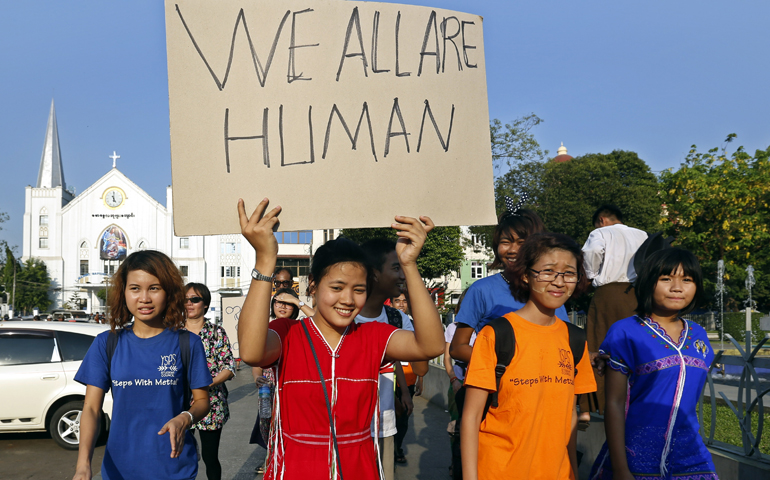
A woman holds a placard as she and others participate in a May 15 march for peace rally in Yangon, Burma (also known as Myanmar). (CNS/Nyein Chan Naing, EPA)
Abuses against religious freedom have reached crisis proportions in Burma (aka Myanmar), where Rohingya Muslims and Christians are suffering terribly despite the country's small steps toward democracy.
Since the end of the colonial period, the situation for Christians and Muslims has never been ideal because they were seen by many other Burmese as tools of the British colonial power, ignoring the fact that Catholicism had been in Burma for 500 years. Buddhism was thought by many as being essential to Burmese identity and culture. For these Burmese, the separation of church and state was considered a foreign imposition.
Despite this, the post-colonial period started with the 1947 Panglong Agreement upholding the principles of equality and self-determination for not only Burma's Buddhist majority, but also diverse ethnic and religious minorities. Independence leader Gen. Aung San — the father of Aung San Suu Kyi, the current Burmese government leader — was a principal author of this agreement.
The situation for Christians and Muslims quickly deteriorated with the military coup in 1962, which tore up the Panglong Agreement. In the five brutal decades that followed the coup, the military exploited the country's diversity, ruling Burma through a divide-and-conquer strategy that pitted Buddhists, Christians, and Muslims against each other. Anyone opposing military rule, including Buddhist monks, were dealt with severely.
The regime instituted a state Ministry of Religious Affairs and a Department for the Promotion and Propagation of Sasana (Buddhist teachings). Although "Ministry of Religious Affairs" is the official translation of the office's name, a more accurate translation of the Burmese is the "Buddhist Mission Ministry." Thus, while the regime made Buddhism a virtual state religion, it perpetrated discrimination and tolerated violence against Muslims and Christians by Ma Ba Tha and other ultra-nationalistic Buddhist monks.
The situation has been so bad that ever since its creation in 1999, the U.S. Commission on International Religious Freedom (USCIRF) has recommended that Myanmar be classified as a "country of particular concern," marking it as one of the world's worst religious freedom abusers.
In every subsequent year, USCIRF made the same recommendation, and in each instance the U.S. State Department has concurred and designated Burma as a CPC.
The abuses against religious freedom in Burma have also been extensively documented in two reports released this week by USCIRF. "Hidden Plight" by Rachel Fleming describes the plight of Christian minorities, and "Suspended in Time" by Tina Mufford, USCIRF's senior policy analyst for the East Asia-Pacific regions, documents the horrendous conditions of the Rohingya Muslims.
Although I am chair of USCIRF, the views expressed here do not necessarily represent the views of the commission.
In recent years, Burma has been seeking to transition itself to a more democratic form of government. Nonetheless, religious and ethnic minorities still suffer grievously.
The most well-known example is that of Burma's Rohingya Muslims.
From the enactment of discriminatory "race-and-religion" laws to assaults by Buddhist extremists, Burma's government and society continue to persecute this beleaguered minority under the notion that Burma should be "one nation, one race, one religion."
According to Mufford, "Rohingya Muslims, Rakhine Buddhists, and individuals of other ethnicities and beliefs throughout the state have suffered grievous deprivations of basic rights, including inadequate access to food, water, shelter, education, and health care; restrictions on freedom of movement; denial of needed humanitarian aid; limited opportunities to obtain an education or earn a living; egregious human rights abuses resulting in death, injury, and displacement; and, in the case of Rohingya Muslims, the denial of the right to a nationality and citizenship."
Today, hundreds of thousands of Rohingya are stateless, homeless and vulnerable.
The plight of Christians — harrowing but to a different degree — concerns USCIRF as well.
In a number of areas, restrictions on ownership for religious purposes are draconian and public worship nearly impossible.
Coerced conversion to Buddhism continues, as well as violence against churches, often related to long-standing ethnic armed conflicts with Burma's military.
"From the early 1990s onward, the military increased its occupation of predominantly Christian Chin, Kachin, and Naga areas, destroying churches and crosses while simultaneously expanding Buddhist infrastructure such as monasteries and pagodas, at times with the use of forced labor exacted from Christians," according to Fleming. "The military routinely occupies churches and summons entire congregations for interrogation." To date, approximately 150,000 people have been forced to flee.
In short, the plight of both Rohingya Muslims and ethnic Christians results from the actions of successive governments that have both perpetrated and tolerated severe religious freedom violations. The situation is especially dire because food shortages are getting critical with the possibility of permanent harm, especially to children, on the immediate horizon.
As long as these violations continue, Burma will not become a stable, secure and unified country. It's time for Burma to defend religious freedom and embrace its brighter, earlier vision of a multi-religious, multi-ethnic society of unity and tolerance. At a minimum, it must stop the persecution and violence against Christian and Muslim minorities.
[Jesuit Fr. Thomas Reese is a senior analyst for NCR and author of Inside the Vatican: The Politics and Organization of the Catholic Church. His email address is treesesj@ncronline.org.]
Editor's note: We can send you an email alert every time Thomas Reese's column, Faith and Justice, is posted. Go to this page and follow directions: Email alert sign-up.




